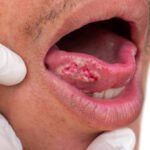Nail biting
Nail biting typically starts in childhood and continues into adulthood. While nail biting is a common problem, it can be caused by several factors that range from genetics to stress and anxiety.
Although the behavior may seem simple to stop, many individuals who have attempted to break the habit have not succeeded. Instead, they experience unsightly nails, soreness around the nails, and risk damage to the skin, cuticles, and nail bed.
This article discusses the causes that lead to nail biting, how to stop biting your nails, and when to see a healthcare provider.


Why Do I Bite My Nails?
Nail biting, or onychophagia, is also known as pathological grooming. It can also be a behavior associated with certain obsessive-compulsive disorders (OCDs) like trichtotillomania (hair pulling) and dermatillomania (skin pricking). Nail biting can also be caused by stress and anxiety, boredom, and mental health disorders.
Stress and Anxiety
The behaviors stated above may be triggered by events that cause stress and anxiety. Unlike physical reactions, like a pounding heart or hyperventilation, which can result in a fight-or-flight response, nail biting is a way of releasing stress and anxiety because it feels good.1
Boredom
A Scientific American article published in 2015 states that stress is not the only reason for compulsion disorders, but, rather, boredom and frustration can also trigger the need to do something instead of nothing. This type of behavior can be brought on by a perfectionist personality.2
It may also be that nail-biting occurs automatically (without thinking about it) to keep your hands busy when you’re bored.3
Mental Health Disorders
The fifth edition of the American Psychiatric Association’s Diagnostic and Statistical Manual of Mental Disorders (DSM-5) notes that nail biting is a body-focused repetitive behavior disorder listed under obsessive-compulsive disorder.1
Obsessive-compulsive disorder is a mental health condition where an individual has unwanted thoughts, ideas, or sensations (obsessions) that make them driven to do something repetitively (compulsions).4
Behaviors of this type can interrupt a person’s day-to-day activities and personal interactions. Not acting out on the compulsive behavior causes more distress than relief. In the case of compulsive nail biting, it feels good and releases stress.
- Attention deficit hyperactivity disorder (ADHD)
- Oppositional defiant disorder (when an individual is defiant and disobedient towards people of authority)
- Separation anxiety disorder
- Tourette’s syndrome5
- Depressive disorder6
Genetics
Some studies indicate that if you’re a nail-biter it’s most likely that you picked up the habit from your parents, not by observation, but from genetics. Although how genetics are involved is not known, research has found:
- Greater than 30% of nail biters have a family member who is also a nail biter.7
- Twin studies show that identical twins are more likely to be nail-biters than fraternal twins.7
- If the nail-biter has obsessive-compulsive disorder, family aggregation studies indicate that the disorder is genetic.8
Risks of Nail Biting
Nail biting has several potential side effects, including:3
- Dental problems such as misalignment and chipped teeth
- Fungal infections in the nail bed
- Illness, such as colds and flu as fingers pass bacteria to your mouth
- Mouth issues, including jaw pain and soft tissue injuries
- Skin infections
- Tissue damage to fingers, nails and cuticles
If you bite your nails on occasion, they will grow back normally. However, habitual nail biting can disrupt normal nail growth and result in deformed nails.
How to Stop Nail Biting
Being under a great deal of stress and anxiety may lead to persistent nail biting. To break the nail-biting habit or to treat long-term nail-biting that results from psychological disorders, learn the triggers that lead to nail biting and take appropriate measures to stop the habit.
Strategies may include keeping your hands busy, using bitter nail polish, trimming your nails short, and cognitive behavioral therapy (CBT).
Cut Them Short
The easiest solution is to simply cut your nails short, which may motivate you to not bite them. However, if you often experience stress and anxiety, or have obsessive-compulsive disorder, even short nails may not deter you from biting them or chewing on cuticles or hangnails.
Get a Manicure or Trim Often
Investing the time and expense in a manicure or trimming nails often may be enough incentive to not bite your nails. Another option is to wear gloves to prevent nail biting.
Keep Your Hands Busy
An easy and efficient way to keep your fingers away from your mouth is to keep your hands busy. There are many creative activities you can try to distract you from nail biting, such as:
- Cooking
- Crocheting
- Knitting
- Painting
- Sculpting
- Clay work
Use Bitter Nail Polish
You can find bitter-tasting nail polish at a local pharmacy and apply it to your nails. If you’re unable to locate this type of nail polish, another option is to spray a bitter apple mixture on your hands. You can make it using white vinegar, apple cider vinegar, and water.
Manage Stress and Anxiety
Understanding the triggers that make you anxious, stressed, or bored may help to stop nail biting. If you’re unable to stop, and nail-biting becomes more and more habitual, talk to your healthcare provider to get a referral to a therapist.
Therapists may work with you using CBT, a type of talk therapy that teaches you to change negative behaviors and emotions by altering negative thought patterns. If you have a mental health disorder, like OCD, you may need medication to treat the condition.
When to See a Healthcare Provider
An occasional nibble on your nails may not require a visit to a healthcare provider, but if your nail beds are infected and the infection has spread to your mouth, you will need to see a healthcare provider to be treated with antibiotics.
If your nail biting has reached a point that you can’t stop and it is affecting your self-esteem and relationships, ask for a referral to see a therapist.







